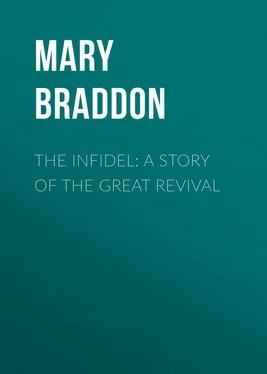Mary Braddon - The Infidel - A Story of the Great Revival
Здесь есть возможность читать онлайн «Mary Braddon - The Infidel - A Story of the Great Revival» — ознакомительный отрывок электронной книги совершенно бесплатно, а после прочтения отрывка купить полную версию. В некоторых случаях можно слушать аудио, скачать через торрент в формате fb2 и присутствует краткое содержание. Жанр: foreign_prose, на английском языке. Описание произведения, (предисловие) а так же отзывы посетителей доступны на портале библиотеки ЛибКат.
- Название:The Infidel: A Story of the Great Revival
- Автор:
- Жанр:
- Год:неизвестен
- ISBN:нет данных
- Рейтинг книги:5 / 5. Голосов: 1
-
Избранное:Добавить в избранное
- Отзывы:
-
Ваша оценка:
- 100
- 1
- 2
- 3
- 4
- 5
The Infidel: A Story of the Great Revival: краткое содержание, описание и аннотация
Предлагаем к чтению аннотацию, описание, краткое содержание или предисловие (зависит от того, что написал сам автор книги «The Infidel: A Story of the Great Revival»). Если вы не нашли необходимую информацию о книге — напишите в комментариях, мы постараемся отыскать её.
The Infidel: A Story of the Great Revival — читать онлайн ознакомительный отрывок
Ниже представлен текст книги, разбитый по страницам. Система сохранения места последней прочитанной страницы, позволяет с удобством читать онлайн бесплатно книгу «The Infidel: A Story of the Great Revival», без необходимости каждый раз заново искать на чём Вы остановились. Поставьте закладку, и сможете в любой момент перейти на страницу, на которой закончили чтение.
Интервал:
Закладка:
Two years ago George Stobart had been one of the most promising soldiers in His Majesty's army, a man who loved his profession, who had distinguished himself as a subaltern at Fontenoy, and was marked by his seniors for promotion. He had been also one of the best-dressed and best-mannered young men in London society, and at the Bath and the Wells a star of the first magnitude.
What was he now? Kilrush shuddered as he marked the change.
"A sanctimonious prig," thought his lordship; "a creature of moods and hallucinations, who might be expected at any hour to turn lay preacher, and jog from Surrey to Cornwall on one of his superannuated chargers, bawling the blasphemous familiarities of the new school to the mob on rural commons, escaping by the skin of his teeth from the savages of the manufacturing districts, casting in his itinerant lot with Whitefield and the Wesleys."
To Kilrush such a transformation meant little short of lunacy. He was indignant at his kinsman's decadence; and when he gave a curt and almost uncivil nod to the poor dependent, bending over her plain needlework yonder betwixt sun and shade, it was because he suspected that pretty piece of lowborn pink-and-white to have some part in the change that had been wrought so suddenly.
Two years ago, at an evening service in John Wesley's chapel at the Old Foundery, George Stobart had been "convinced of sin." Swift as the descent of the dove over the waters of the Jordan had been the awakening of his conscience from the long sleep of boyhood and youth. In that awful moment the depth of his iniquity had been opened to him, and he had discovered the hollowness of a life without God in the world. He had looked along the backward path of years, and had seen himself a child, drowsily enduring the familiar liturgy, sleeping through the hated sermon; a lad at Eton, making a jest of holy things, scorning any assumption of religion in his schoolfellows, insolent to his masters, arrogant and uncharitable, shirking everything that did not minister to his own pleasures or his own aims, studious only in the pursuit of selfish ambitions, dreaming of future greatness to be won amidst the carnage of battles as ruthless, as unnecessary, as Malplaquet.
And following those early years of self-love and impiety there had come a season of darker sins, of the sins which prosperous youth calls pleasure, sins that had sat so lightly on the slumbering conscience, but which filled the awakened soul with horror.
His first impulse after that spiritual regeneration was to sell out of the army. This was the one tangible and irrevocable sacrifice that lay in his power. The more he loved a soldier's career, the more ardently he had aspired to military renown, the more obvious was the duty of renunciation. The treaty of Aix-la-Chapelle had but just been concluded, and the troubles in America had not begun, so there seemed no chance of his regiment being sent on active service, but his conduct seemed not the less extraordinary to his commanding officer.
"Do you do this to please your mother?" he asked.
"No, sir; I do it to please Christ."
The colonel rapped his forehead significantly as Stobart left the room.
"Another victim of the Oxford Methodists," he said. "If they are allowed to go on, England will be peopled with hare-brained enthusiasts, and we shall have neither soldiers nor sailors."
Mrs. Stobart was furious with her son for his abandonment of a career in which she had expected him to win distinction. For some months after his "call" she had refused to speak to him, and had left him to his solitary meditations in his own rooms at Stobart Lodge. In this gloomy period they had met only at meals, and it had vexed her to see that her son took no wine, and refused all the daintier dishes upon the table, all those ragouts and salmis that adorned the board in sumptuous covered dishes of Georgian silver, and which were the pride of cook and dinner-giver.
"I give myself a useless trouble in looking at the bill of fare every morning," Mrs. Stobart said angrily, as the side dishes were removed untasted, breaking in upon a melancholy silence that had lasted from the soup to the game. "God knows I need little for myself; but you used to appreciate a good dinner."
"I have learnt to appreciate higher things, madam."
"I might as well order a leg of mutton and a suet pudding every day in the week."
"Indeed, my dear mother, I desire nothing better."
"With a cook at forty guineas a year!"
"Dismiss her, and let the kitchen wench dress our simple meals."
"And make myself a laughing-stock to my friends."
"To your idle acquaintances only – friends esteem us for deeper reasons. Ah, madam, if you would but hearken to the voices I hear, court the friends I love, you would scorn the worldling's life as I scorn it. To the heir of a boundless estate in the Kingdom of Heaven 'tis idle to waste thought and toil upon a trumpery speck of earth."
"Oh, those Oxford Methodists! You have caught their jargon. I am a good Churchwoman, George, and I hate cant."
"You are a good woman, madam. But what is it to be a good Churchwoman? To attend a morning service once a week in a church where there is neither charity nor enthusiasm, upon whose dull decorum the hungry and the naked dare not intrude – a service that takes no cognizance of sinners, save in a formula that the lips repeat while the heart remains dead; to eat a cold dinner on the Sabbath in order that your servants may join in the same heartless mockery of worship; to listen to the barren dogma of a preacher whose life you know for evil, and whose intellect you despise."
Mother and son had many such conversations – oases in a desert of sullen silence – before Mrs. Stobart's conversion; but that conversion came at last, partly by the preaching of John Wesley, whom her son worshipped, and partly by the influence of Lady Huntingdon and other ladies of birth and fortune, whose example appealed to the fashionable Maria Stobart as no meaner example could have done. She began to think less scornfully of the Great Revival when she found her equals in rank among the most ardent followers of Whitefield and the Wesleys: and within a year of her son's awakening she, too, became convinced of sin, the firstfruits of which conversion were shown by the dismissal of her forty-guinea cook, her second footman, the third stable servant, and the sale of a fine pair of carriage-horses. She had even contemplated dispensing with her own maid, but was prevented by a sense of her patrician incapability of getting into her clothes or out of them without help. She made, perhaps, a still greater sacrifice by changing her dressmaker from a Parisienne in St. James's to a woman at Kennington, who worked for the Quaker families on Denmark Hill.
After about ten minutes' conversation with this lady, of whose mental capacity he had but a poor opinion, Lord Kilrush invited her son to a turn in the fruit garden – a garden planned fifty years before, and maintained in all the perfection of espaliered walks and herbacious borders, masking the spacious area devoted to celery, asparagus, and the homelier vegetables. High brick walls, heavily buttressed, surmounted this garden on three sides, the fourth side being divided from lawn and parterre by a ten-foot yew hedge. At the further end, making a central point in the distance, there was a handsome red-brick orangery, flanked on either side by a hothouse, while at one angle of the wall an octagonal summer-house of two stories overlooked the whole, and afforded an extensive view of the open country across the river, from Notting Hill to Harrow. Established wealth and comfort could hardly find a better indication than in this delightful garden.
"Upon my soul," cried Kilrush, "you have a little paradise in this rus in urbe! Come, George, I am glad to see you look so well in health, and I hope soon to be gratified by seeing you make an end of your crazy life, and return to a world you were created to serve and adorn. If the army will not please you, there is the political arena open to every young man of means and talent. I should like to see your name rank with the Townsends and the Pelhams before I die."
Читать дальшеИнтервал:
Закладка:
Похожие книги на «The Infidel: A Story of the Great Revival»
Представляем Вашему вниманию похожие книги на «The Infidel: A Story of the Great Revival» списком для выбора. Мы отобрали схожую по названию и смыслу литературу в надежде предоставить читателям больше вариантов отыскать новые, интересные, ещё непрочитанные произведения.
Обсуждение, отзывы о книге «The Infidel: A Story of the Great Revival» и просто собственные мнения читателей. Оставьте ваши комментарии, напишите, что Вы думаете о произведении, его смысле или главных героях. Укажите что конкретно понравилось, а что нет, и почему Вы так считаете.












